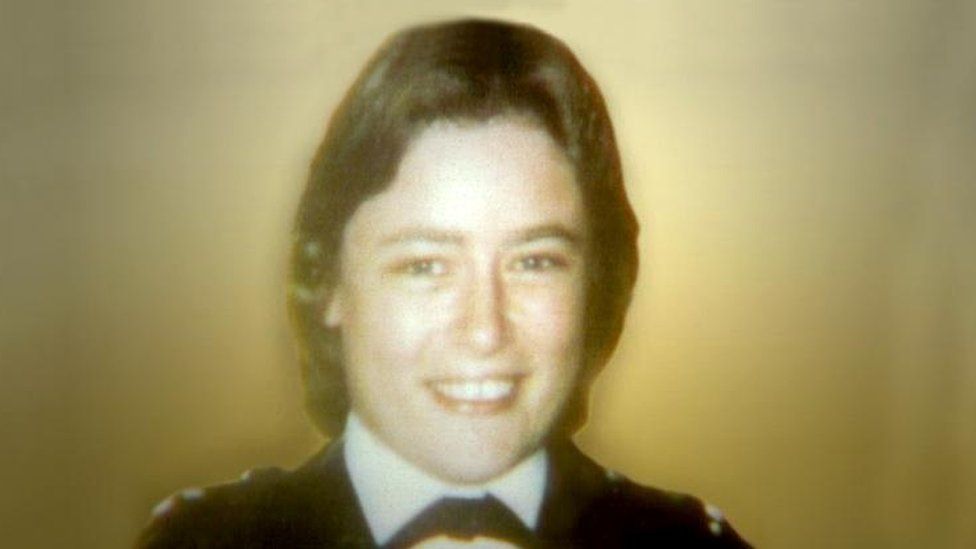Yvonne Fletcher murder: Libyan suspect faces private prosecution
- Published

A police officer who held the hand of his dying colleague after she was shot 40 years ago is launching a private prosecution of one of the suspects.
PC Yvonne Fletcher was killed when gunmen in London's then Libyan embassy fired into a demonstration outside.
Her colleague, John Murray, is going to court to demand the remaining key suspect is tried for murder. He said he promised her he would "get justice".
The case is being launched on the 40th anniversary of PC Fletcher's death.
The first court hearing is expected in the coming weeks.
PC Fletcher, 25, was gunned down while she and other officers controlled crowds protesting against the Libyan dictator Colonel Muammar Gaddafi.
"She's sorely missed," Mr Murray told BBC Breakfast. The former officer was with her when she was killed, and "cradled her as she lay down".
All the shots were fired from inside the embassy, also known as the Libyan People's Bureau. After a 10-day siege, Margaret Thatcher's government allowed all the Libyans to leave because they were protected by diplomatic immunity - and to this day nobody has been charged in relation to PC Fletcher's death.
In 2017 the Crown Prosecution Service dropped a possible case against one of the suspects because some of the evidence against him could not be used in court because it related to secret national security matters.
But Mr Murray says he now has a legal team to launch a rare private prosecution for murder against Saleh Ibrahim Mabrouk.
"The last few words that Yvonne heard before she died was my voice telling her that I would find out who and why this had happened to her," he said, standing where she was shot ahead of her memorial service.
"I also said to her that I would get justice. That was a promise I made. That is a promise I will certainly keep, and the fight goes on."
In 2019 the retired officer sued Mr Mabrouk for damages in the High Court. Mr Mabrouk denied any wrongdoing in a response he sent to the court from Libya.
A judge later found Mr Mabrouk "jointly liable" for the shootings, although he had not been one of the gunmen himself, and awarded Mr Murray symbolic damages of £1.
The ruling examining the allegations of who had been responsible for what happened has paved the way for the more serious allegation of murder to be made in a private criminal prosecution.
"To this very day the quest for justice for Yvonne continues," said Mr Murray.
"If the CPS cannot or will not proceed with criminal charges, the only option available is to embark on our own legal action in the criminal courts."
Mr Murray's private prosecution means he will use the same legal power available to anyone else to ask a court to begin a case against Mr Mabrouk.
However, it is not clear whether he and his lawyers will be able to get the case over a series of legal hurdles.
The case can be taken over or stopped at any time by the Director of Public Prosecutions.
If the DPP does not step in, Mr Murray will ask a court to order that the suspect is brought to the UK - but it is unclear what the government and law enforcement agencies would then do.
Wednesday morning will see retired officers gather at the memorial to PC Fletcher close to where she was shot. Members of the officer's family are remembering her privately and not taking part in the event.
A senior figure from the Metropolitan Police will attend a separate private event - although it has denied that serving officers have been banned from attending the larger memorial.
The Met's Commissioner Sir Mark Rowley said: "WPC Yvonne Fletcher was just 25 when she was callously murdered. She was simply doing her job, policing protest, not unlike what many officers do so often today."
Related Topics
- Published16 November 2021